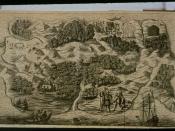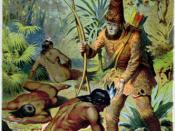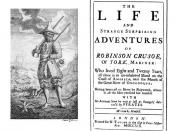'In all the time of my solitary life, I never felt so earnest, so strong a desire after the society of my fellow-creatures, or so deep a regret at the want of it.' (Robinson Crusoe). Use this quotation as a starting point for the exploration of the self in Robinson CrusoeSelf is broadly defined as the essential qualities that make a person distinct from all others. In Defoe's words the word, "governs the whole world; the present Race of Men all come into it. 'tis the foundation of every prospect in life, the beginning and end of our Actions." It is the essence of man.
Crusoe undergoes a journey of self discovery whilst on the island. He learns things about himself that, quite probably, only years of isolation could have brought out in him. Defoe's novel was the first of a long pattern of story writing in which the hero undergoes a massive devlopment and maturation.
Preliminary ignorance allows Crusoe to acquire wisdom whereby in Richetti's words, "the self can gradually discover outside itself that which it carries within."Defoe's exploration of the self lies in Crusoe's journey of self-discovery and his accomplishments in isolation vs. the inevitable loneliness that his life of solitude entails. The story explores how an individual can survive without society in the state of nature that the deserted island provides. Crusoe adapts to island life incredibly well, exploiting his limited resources and becoming completely self-reliant. It is a stirring account of the personal growth and devlopment of the self that takes place whilst stranded in solitude. Crusoe withdraws from the external social world and turns inward. In his 'solitary life' Crusoe is in fact able to explore himself and gains a sense of self-awareness by the end of the novel.
We see that...


